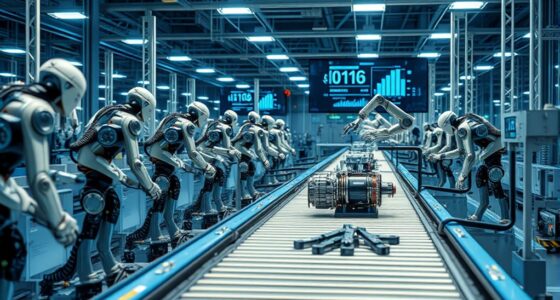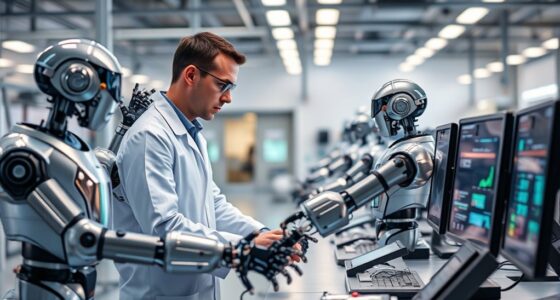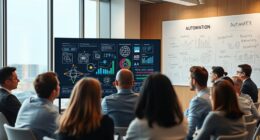While AI and automation handle routine tasks, they can’t replace your empathy, emotional intelligence, or complex problem-solving skills. Your ability to build trust, interpret nuances, and make ethical decisions remains indispensable in healthcare, legal services, and industries requiring human judgment. Adaptability and interpersonal skills help you navigate change and foster innovation. Want to discover which human qualities are most crucial for future success and how to prepare? Keep exploring so you stay ahead.
Key Takeaways
- Empathy and emotional intelligence enable human connection, trust, and conflict resolution that technology cannot replicate.
- Complex decision-making, ethical judgment, and interpreting nuanced context remain human strengths.
- Personalized care and culturally sensitive interactions in healthcare and legal services rely on human insight.
- Creativity, intuition, and strategic thinking are irreplaceable human skills driving innovation and adaptability.
- Building genuine relationships, understanding emotional cues, and fostering loyalty require human engagement.
The Irreplaceable Role of Empathy and Emotional Intelligence

Despite advances in automation and artificial intelligence, empathy and emotional intelligence remain essential human skills in the workplace. You’ll find that EQ is among the top skills in demand through 2025 and is expected to grow by 26% by 2030. It’s called the “new workplace currency” because it drives success, helps you build trust, and enhances collaboration. High EQ makes it easier to navigate cultural differences and resolve conflicts, turning challenges into growth opportunities. When you show empathy, you foster a positive environment where team members feel respected and understood. This boosts morale, improves teamwork, and increases job satisfaction. Organizations prioritize EQ because it enhances resilience and adaptability, making it a key driver of long-term success. Research shows that emotional intelligence is highly sought after by hiring teams and influences promotions and raises. Your emotional skills are more valuable than ever, especially considering how interpersonal relationships contribute to a productive and harmonious work environment. Furthermore, developing these skills aligns with principles from the Law of Attraction, as fostering positive connections attracts supportive and collaborative energies. Additionally, cultivating cultural awareness can further strengthen interpersonal skills and improve global teamwork. Building these competencies also involves understanding emotional regulation, which is crucial for maintaining professionalism under pressure and managing stress effectively. Incorporating sleep and relaxation techniques can significantly improve emotional regulation and overall workplace performance.
Complex Problem-Solving and Critical Decision-Making in Human Hands

While emotional intelligence helps foster trust and collaboration, tackling complex problems and making critical decisions often require uniquely human skills. Human problem-solving involves reasoning, creativity, and intuition—areas AI hasn’t fully mastered. You can interpret context, nuances, and abstract ideas that are essential for nuanced solutions. Unstructured data adds layers of meaning that require human insight to fully understand. Developing emotional intelligence can enhance your ability to navigate social complexities and improve decision-making processes. Ethical considerations also demand human judgment to ensure outcomes align with societal values. Innovative breakthroughs often stem from combining existing knowledge with fresh insights, a distinctly human trait. Additionally, your adaptability allows you to respond effectively to new challenges, leveraging experience and flexibility. Recognizing the importance of legal knowledge helps you understand how complex processes like divorce are managed and navigated. Moreover, understanding cultural context is crucial for making decisions that are respectful and appropriate across different societies. When it comes to critical decisions, your strategic vision, risk assessment, and understanding of organizational culture remain irreplaceable. In unpredictable situations, your flexibility and judgment are essential for effective, responsible decision-making. Furthermore, harnessing technological literacy enables humans to evaluate and integrate new tools while maintaining ethical standards.
The Nuance of Human Interaction in Healthcare and Legal Services

Human interaction remains essential in healthcare and legal services because it allows professionals to interpret subtle emotional cues and contextual nuances that AI cannot fully grasp. In healthcare, empathy helps clinicians understand patients’ feelings, encouraging trust and active participation in care plans. Emotional intelligence enables providers to respond compassionately, especially during emotionally charged situations like terminal illness or mental health crises. Additionally, color accuracy plays a role in diagnostic tools and visual assessments, emphasizing the importance of human oversight in ensuring precise evaluations. Moreover, the ability to evaluate non-verbal communication further underscores the significance of human judgment in clinical settings. Recognizing the importance of emotional support helps healthcare professionals provide comfort and reassurance that technology cannot replicate. Furthermore, incorporating personalized care approaches allows providers to tailor treatments to individual patient needs, which enhances outcomes and satisfaction. The capacity for cultural sensitivity also ensures that diverse patient backgrounds are respected and understood, fostering better patient-provider relationships. Similarly, in legal services, understanding client concerns and reading emotional signals influence advice and strategy. Trust and confidentiality are built through personal interaction, which AI struggles to replicate. Judges and lawyers rely on intuition and experience to tackle complex legal nuances, ethical dilemmas, and evolving case law. Ultimately, genuine human connection fosters trust, understanding, and holistic care that technology alone cannot replace.
Adaptability and Human Judgment in Dynamic Industries

In industries characterized by rapid change and complexity, adaptability and human judgment stand out as vital strengths that technology alone cannot replicate. Your ability to adapt and make nuanced decisions ensures success amid evolving landscapes. Organizations with adaptable employees outperform peers by 1.7 times, and effective change management boosts project success by 54%. Investing in training and developing digital literacy keeps you resilient. Human judgment excels in high-stakes decision-making, risk assessment, and fostering collaboration—areas where technology falls short. Your creativity and problem-solving skills drive innovation and navigate complex challenges. The capacity for emotional intelligence plays a crucial role in understanding and responding to human needs, further emphasizing the irreplaceable nature of human judgment. Cultivating interpersonal skills enhances team synergy and client relationships, which are essential in a competitive market. Additionally, sound design specialists often rely on their intuitive understanding of narrative pacing and emotional impact, which are difficult to quantify and replicate with AI. Recognizing the importance of adaptability in dynamic industries can help organizations stay ahead in the digital age. Emphasizing the importance of customer engagement ensures that organizations remain responsive and competitive in a digital age.
The Economic and Job Market Impacts of AI and Automation

AI is expected to boost productivity by adding trillions in economic growth, but it also threatens millions of jobs worldwide through automation. While new roles in tech and data fields emerge, many industries like customer service and banking face significant displacement. How societies manage these shifts will shape the future of work and economic stability. Additionally, automation’s role in business intelligence enhances data analysis speed and accuracy, enabling real-time decision-making and predictive analytics.
Job Displacement Trends
Have you noticed how automation and AI are transforming the job landscape? Currently, about 14% of workers have experienced job displacement because of these technologies. In May 2023 alone, 3,900 jobs in the U.S. were directly lost to AI, mainly in industries with routine tasks. Around 12.6% of U.S. employment faces high exposure to automation, and the figures are expected to rise as AI adoption accelerates. While AI is projected to displace 75 million jobs globally by 2025, it’s also creating 133 million new roles, resulting in a net gain of 58 million jobs. Sectors like manufacturing are hit hardest, but healthcare and education are seeing growth. The evolving job market demands that you adapt and develop new skills to stay relevant amid these displacement trends. Current impact shows that 14% of workers have experienced job displacement due to AI.
Economic Growth Prospects
The integration of AI and automation is driving remarkable economic growth, transforming industries and boosting local and global economies alike. By 2030, AI is projected to generate $15.7 trillion in revenue, increasing GDP by 26% in many regions. The US AI market alone is valued at nearly $74 billion in 2025, with a growth rate of 26.95%, while the global market is expected to expand by 38% in 2025. AI chip revenue may reach $83.25 billion by 2027, reflecting rising hardware demand. Companies are investing heavily, with 92% planning to increase AI spending over three years. This growth fuels sectoral expansion, creates new jobs, and accelerates digital transformation across industries, promising a robust economic outlook driven by continuous innovation and investment. The global AI market is expanding rapidly, further underscoring the increasing importance of AI-driven technologies in shaping future economic landscapes.
Future Skills and the Path Toward a Collaborative Human-Tech Workforce

As technology continues to evolve, developing future-ready skills becomes essential for building a collaborative human-tech workforce. You’ll need to focus on key areas that complement AI and automation. Consider these three priorities:
- Master analytical thinking, which 70% of employers will seek by 2025, across all industries. Analytical and creative thinking will remain critical and grow in importance, enabling workers to interpret complex data and generate innovative solutions.
- Cultivate human capabilities like resilience, social influence, and leadership—skills AI can’t replicate.
- Invest in lifelong learning to stay current with fast-growing skills such as AI, cybersecurity, and big data.
Frequently Asked Questions
How Does Emotional Intelligence Enhance Customer Service Experiences?
You see, emotional intelligence enhances customer service by making interactions more empathetic and personalized. When you listen actively and understand your customers’ emotions, you build trust and stronger connections. This helps resolve conflicts effectively and creates a positive experience. Customers feel valued and understood, boosting their satisfaction and loyalty. By showing empathy, you also improve your brand’s reputation, ensuring customers keep coming back and share their positive experiences with others.
What Makes Complex Problem-Solving Uniquely Human?
Ever wonder what truly sets human problem-solving apart? It’s your ability to process multiple inputs simultaneously, adapt strategies in real time, and draw on diverse knowledge across disciplines. You manage uncertainty with neural flexibility, balance cognitive load, and incorporate practical, real-life considerations. Your social skills, empathy, and creativity enable you to tackle complex challenges that tech alone can’t handle. These qualities make your problem-solving uniquely human and irreplaceable.
Why Is Human Judgment Critical in Healthcare Decisions?
You need human judgment in healthcare because it allows you to handle complex tradeoffs that algorithms can’t fully grasp. You can interpret ambiguous information, consider patient preferences, and apply moral and ethical reasoning that go beyond data. Your empathy and communication skills build trust, ensuring personalized care. You blend evidence with experience, adapting guidelines to each individual’s unique situation, making your judgment essential for effective, compassionate healthcare decisions.
How Do Humans Adapt Faster Than AI in Changing Environments?
It’s ironic how you adapt faster than AI, even though machines are designed to process data quickly. You intuitively read subtle cues, reframe problems, and improvise on the spot, making split-second decisions without needing retraining. When environments change unpredictably, your ability to assess risks, learn from failures, and pivot seamlessly outpaces AI’s rigid algorithms. Your natural flexibility keeps you ahead in uncertain, dynamic situations, proving human resilience is unmatched.
What Skills Will Ensure Job Security Amid AI Advancements?
You can guarantee job security by sharpening skills AI can’t easily replicate. Focus on developing your emotional intelligence, such as empathy and interpersonal communication, to build trust and lead effectively. Cultivate creativity and innovative thinking to generate original ideas and adapt to change. Strengthen critical and strategic thinking for complex problem-solving and decision-making. Emphasize ethical judgment and leadership qualities that inspire and motivate others, making you indispensable in any evolving workplace.
Conclusion
While machines can analyze data swiftly, they can’t replicate your empathy or intuition. Imagine a robot trying to comfort a distressed patient or navigate complex legal nuances—it’s a stark contrast to your human touch. As technology advances, you’ll find yourself working alongside AI, not replaced by it. Your uniquely human skills—empathy, judgment, adaptability—remain irreplaceable, shaping a future where human and machine collaborate, each complementing the other in ways no algorithm ever could.









